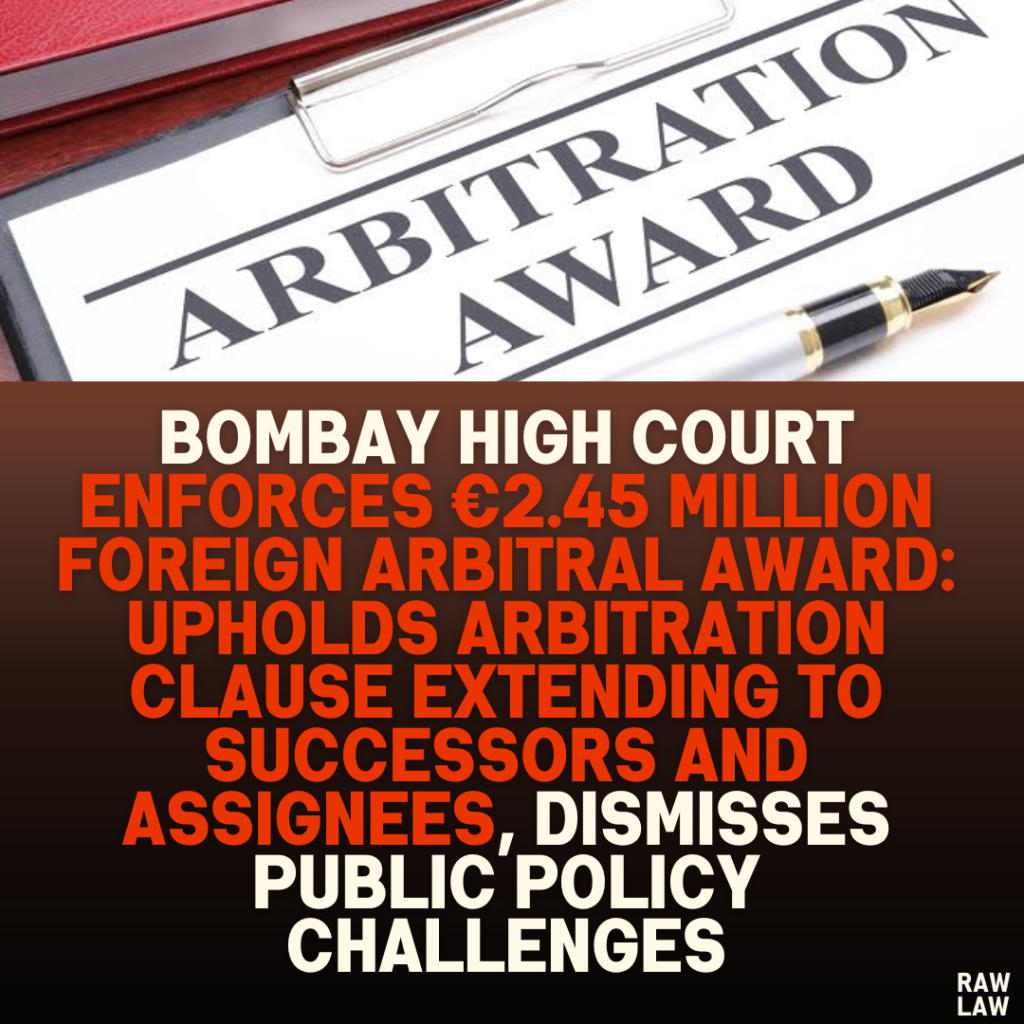Court’s Decision:
The Bombay High Court allowed the enforcement of the foreign arbitral award under Section 48 of the Arbitration and Conciliation Act, 1996. It ruled that the objections raised by the respondent were untenable, particularly because the respondent had not challenged the arbitral tribunal’s findings when it had the opportunity. The Court found no violation of public policy, fundamental principles of Indian law, or basic notions of morality and justice, and upheld the arbitral award for €2.45 million in favor of the petitioner.
Facts:
- The Agreement and Dispute:
- In 2006, the petitioner and respondent entered into a consortium agreement for constructing power plants in Sudan.
- The respondent, as the lead member of the consortium, entered into contracts with the National Electricity Corporation (NEC) of Sudan for designing, constructing, and commissioning two power plants. These contracts were governed by Sudanese law, with arbitration under the ICC Rules in London.
- Assignment and Tribunal Proceedings:
- NEC assigned its rights to the petitioner through various instruments, including a deed of assignment in 2012.
- The petitioner initiated arbitration, where the respondent challenged the tribunal’s jurisdiction, claiming there was no binding arbitration agreement.
- The tribunal ruled via a Partial Award that a valid arbitration agreement existed. Subsequently, a Final Award of €2.45 million was passed in favor of the petitioner.
- Respondent’s Challenges:
- The respondent did not challenge the Partial or Final Awards in London but filed a petition under Section 34 of the Arbitration Act in Karnataka, which was later withdrawn.
- The respondent then opposed the enforcement of the award in the Bombay High Court, claiming violations of public policy.
Issues:
- Was the assignment of rights from NEC to the petitioner valid, especially in light of the respondent’s objections?
- Did the arbitration agreement extend to the petitioner, a non-signatory to the original contracts?
- Did the arbitral award violate Indian public policy, fundamental legal principles, or notions of morality and justice under Section 48 of the Arbitration Act?
Petitioner’s Arguments:
- Validity of Assignment:
- The assignment was valid under Sudanese law, as determined by the arbitral tribunal. The respondent, being a party to the arbitration, could not revisit this issue.
- The contract defined “Employer” to include successors and assignees, reflecting the intention to allow assignments.
- Arbitration Agreement’s Scope:
- The broad wording of the arbitration clause included disputes “arising out of or in connection with” the contract, making it applicable to assignees.
- Finality of Tribunal’s Findings:
- The tribunal had ruled on jurisdiction and validity in its Partial Award, which the respondent had accepted by not challenging it.
- Pro-Enforcement Bias:
- The enforcement of foreign awards is limited to specific grounds under Section 48, which do not allow a review on the merits.
Respondent’s Arguments:
- Public Policy Objections:
- The assignment was unilateral and lacked the respondent’s consent, violating Indian public policy and fundamental legal principles.
- The arbitral tribunal did not consider Indian law while determining the validity of the assignment.
- Scope of Arbitration Agreement:
- The arbitration agreement could not bind non-signatories, including the petitioner, as it did not consent to arbitration with the petitioner.
- Merits of the Award:
- The award relied on unjust enrichment principles, which were not applicable because the contracts were valid and ongoing.
- The tribunal’s reliance on inconsistent testimony from the petitioner’s witness violated basic principles of justice.
Analysis of the Law:
- Public Policy under Section 48:
- The Court emphasized that public policy objections must involve contraventions that shock the conscience of the court. The respondent’s arguments did not meet this high threshold.
- Validity of Assignment:
- The assignment was valid under Sudanese law, which governed the contract. Indian courts could not reassess the tribunal’s factual findings.
- Arbitration Agreement’s Applicability:
- The contract explicitly allowed assignments, and the arbitration clause covered disputes involving successors and assignees.
- Scope of Review:
- Section 48 expressly limits judicial interference in enforcement proceedings. The Court cannot revisit the merits of the tribunal’s decisions.
Precedent Analysis:
The Court relied on several precedents to reject the respondent’s objections:
- McDermott International Inc. v. Burn Standard Co. Ltd.: Tribunal findings on procedural matters are final if not challenged in time.
- Ssangyong Engineering & Construction Co. Ltd. v. NHAI: Public policy challenges require exceptional circumstances that shock the conscience.
- Chloro Controls India v. Severn Trent Water: Arbitration agreements can bind successors and non-signatories under certain conditions.
- Cox & Kings Ltd. v. SAP India (P) Ltd.: Contracts allowing assignments inherently bind parties to arbitration.
Court’s Reasoning:
- The respondent failed to challenge the Partial and Final Awards in time, making them final and binding.
- The contract’s language explicitly allowed assignments, and the arbitration clause was broad enough to include disputes involving assignees.
- The tribunal’s decision was consistent with the law governing the contract (Sudanese law).
- The objections raised under public policy were attempts to revisit the merits of the award, which is not permitted under Section 48.
Conclusion:
The Court rejected all objections and enforced the arbitral award, granting the petitioner the right to recover €2.45 million.
Implications:
This decision reinforces India’s pro-enforcement stance on foreign arbitral awards, limiting judicial interference to specific grounds under Section 48. It also clarifies the applicability of arbitration clauses to assignees and non-signatories when the underlying contract permits assignments.



